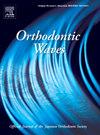使用氯己定时乳胶和非乳胶颌间弹性强度退化的评估
IF 0.5
Q4 DENTISTRY, ORAL SURGERY & MEDICINE
引用次数: 3
摘要
【摘要】目的:评价0.12%氯己定溶液(CHX)对不同颌间胶乳和非胶乳弹性材料强度退化的影响。材料和方法:80块1 / 4英寸弹性材料根据制造商(Morelli™和American Orthodontics™)、弹性材料类型(乳胶和非乳胶)和储存溶液(人工唾液和CHX)分为8组(n = 10)。每个试样延伸至19.2 mm,对应其内径尺寸的3倍,并在万能试验机上验证初始力。然后将橡皮筋拉伸,浸入人工唾液中,在12和24小时内再次评估其强度。储存期结束后,将CHX组弹性材料浸泡在perogard(0.12%氯己定溶液)中1min,进行强度评价。数据(gf)进行三向重复测量方差分析和Tukey检验(α = 0.05)。结果:弹性和时间之间存在显著差异(p < 0.000)。非乳胶和乳胶弹性材料的强度在初始状态和12 h和24 h之间有统计学意义的降低(p < 0.05)。在3次分析中,非乳胶弹性材料的降解值明显高于乳胶弹性材料(p < 0.05)。无论时间和弹性类型,唾液与CHX均无统计学差异(p < 0.05)。结论:与非乳胶弹性材料相比,乳胶弹性材料总体上表现出较小的强度退化。CHX在前12小时不影响强度退化,而时间影响强度退化,在24小时内几乎保持不变。本文章由计算机程序翻译,如有差异,请以英文原文为准。
Evaluation of latex and non-latex intermaxillary elastics strength degradation when submitted to the use of chlorhexidine
ABSTRACT Purpose: To assess the influence of 0.12% chlorhexidine solution (CHX) in the strength degradation of different intermaxillary latex and non-latex elastics. Materials and methods: Eighty ¼ inch elastics were separated into eight groups (n = 10) according to manufacturers (Morelli™ and American Orthodontics™), elastic’s type (latex and non-latex) and storage solution (artificial saliva and CHX). Each sample was extended to 19.2 mm, corresponding to 3x the size of their inner diameter, and initial force was verified on the universal testing machine. The elastics were then kept extended, immersed in artificial saliva and their strength was once again evaluated in the following period of time: 12 and 24 hours. Following the storage period, elastics of CHX groups were immersed for 1 min into PerioGard (0.12% chlorhexidine solution) before the strength evaluation. The data (gf) was submitted to a three-way repeated measure analysis of variance and Tukey’s test (α = 0.05). Results: Significant differences between elastics and time were observed (p < 0.000). Statistically significant reduction in strength was found in non-latex and latex elastics between the initial condition and after 12 h and 24 h (p < 0.05). The non-latex elastics showed statistically higher degradation values than the latex elastics, in the three analysis times (p < 0.05). No statistical difference was found between saliva and CHX, regardless of the time and elastic type (p > 0.05). Conclusions: Generally, the latex elastics showed less strength degradation compared to non-latex elastics. CHX did not affect strength degradation and time influenced strength degradation in the first 12 hours, keeping practically constant for up to 24 hours.
求助全文
通过发布文献求助,成功后即可免费获取论文全文。
去求助
来源期刊

Orthodontic Waves
DENTISTRY, ORAL SURGERY & MEDICINE-
CiteScore
0.40
自引率
0.00%
发文量
0
期刊介绍:
Orthodontic Waves is the official publication of the Japanese Orthodontic Society. The aim of this journal is to foster the advancement of orthodontic research and practice. The journal seeks to publish original articles (i) definitive reports of wide interest to the orthodontic community, (ii) Case Reports and (iii) Short Communications. Research papers stand on the scientific basis of orthodontics. Clinical topics covered include all techniques and approaches to treatment planning. All submissions are subject to peer review.
 求助内容:
求助内容: 应助结果提醒方式:
应助结果提醒方式:


